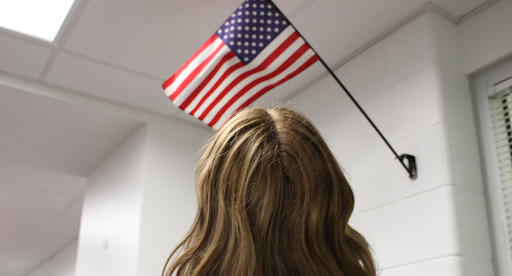
50 stars and 13 stripes. The flag has been the symbol of patriotism since the birth of the United States of America. However, students and teachers alike have diverse opinions on whether the Pledge of Allegiance is a righteous way to honor the country, or a product of routine.
According to CNN, the Pledge was required by some schools until the 1943 ruling of West Virginia Board of Education V. Barnette, stating that, by demanding the Pledge of Allegiance, schools violate students’ constitutional rights under the First Amendment. Ever since then, public schools are prohibited from requiring students to stand for the Pledge of Allegiance.
Transcending past the topic of the Pledge, overall patriotism in young adults has been rapidly declining over the last decade.
According to a poll conducted by Gallup, in 2015, over 40% of young adults said they were “extremely proud” to be American. That percentage dropped to 18% in 2023.
That 18% falls closely to the portion of WS students who choose to stand for the Pledge of Allegiance. In an Instagram survey conducted by The Oracle, of 100 students, only 38% answered that they stand for the Pledge daily.
“[The Pledge] is something that I recite to help me remember the values and what our country is built upon. [By standing], you show people that you put in effort to support them,” said junior Aiden Creech, a representative of the 38%.
As to why 62% of students do not stand for the Pledge, is unclear. Teachers have guesses as to why engagement has dwindled, but have not determined a definite cause.
“I would love it if we could have a conversation about how 20 of the 30 kids in my freshman history class don’t stand for the pledge and how it’s all from this heartfelt belief in one topic or another,” said Mark Witzel, a retired member of the United States Air Force and social studies teacher at WS. “But we both know, that’s not what it is-[participation has decreased because] the Pledge holds no special attraction to many people.”
Cause can even be found in the words of the Pledge. Some students have strong feelings against the meaning, pointedly, of the words “under God.”
According to an article from History.com, the phrase “under God” was not included until the Cold War, “to assert the moral superiority of American capitalism over Soviet communism.”
“I hate that ‘under God’ is in it, that’s the reason I haven’t said the pledge since 3rd grade. No matter your personal religious beliefs, it’s weird for there to be a line clearly focused on Christianity in a pledge for a country founded on religious freedom,” said junior Charlie McClurken-Orr.
In contrast, some students stand for the Pledge out of respect and ignore deeper context that may be irrelevant to them.
“[The Pledge of Allegiance does not mean much to me] because I’m not originally American. I usually say the pledge out of respect for others. Specifically, the military,” said sophomore and Vice President of the Muslim Student Association, Hamza Elashry.
On the other hand, some strong proponents believe that the religious essence of the pledge illustrates the country’s foundational morals.
“[The words ‘under God’] show that our nation was built on certain values that aligned with faith, specifically, Christianity. [Faith] is how you make a country prosper. And that’s how you make the people prosper,” said Creech.
Those who believe participating in the pledge is not a priority demonstrate and discover patriotism in other ways. McClurken-Orr, for example, communicates their patriotism by exercising their constitutional rights.
“I demonstrate patriotism through utilizing the rights I have to advocate for what I believe in, and soon, I will [demonstrate it] by voting,” said McClurken-Orr.
Similar to McClurken-Orr, Witzel claims to demonstrate most of his patriotism through his previous devotion to the United States Air Force, and highlights that direct expression is less important to him.
“I’ve been in combat. I don’t feel like I have to prove anything in terms of outward demonstrations of patriotism. If I’m patriotic, it is on my own in my own special way,” said Witzel.
For a long time, pledges of allegiance have been used as a way to show devotion to one’s country. But with confounding variables such as social media, political debates and religious diversity, what a pledge means to someone might not mean the same for others. These perspectives are for the school administration and the student body to consider.
“I think it’s healthy every once in a while for us to take a step back to ask ourselves, ‘why do we do things the way we do them? Are there things that we’ve just always done that no one thought to ask questions about? Is this what we need?’” proposed Witzel.






